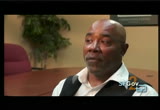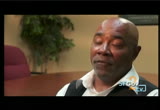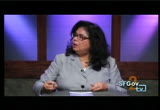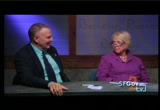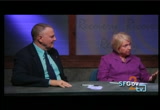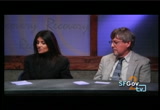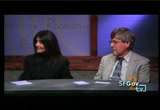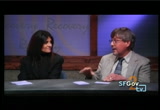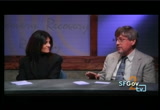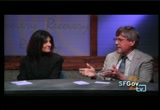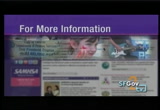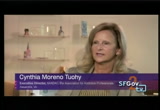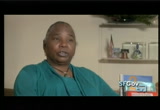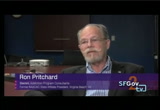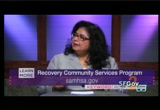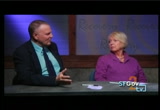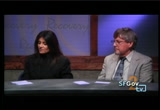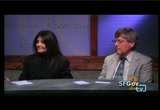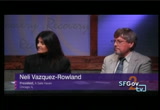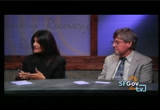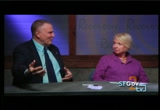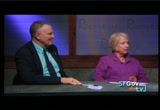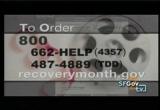tv [untitled] April 8, 2013 1:30pm-2:00pm PDT
1:30 pm
you know, don't judge me because of my past, you know, it's not who i was, it's who i am. you will probably find that those clients are much more long lasting in those employment because they have owned something, they have something that they call their own. they feel that they are of value to themselves. they feel that they're of value to their family and to the community on the whole. my goal is to be a substance abuse counselor because what better job could i have, could i get? not that i say i can't work at some corporate place or be a porter or still, you know, whatever. but, i mean, you know, how, why could i not give away what i have. you know, i lived the life. while the impact of the wecare program is significant in itself-we place over 2,000 people per year directly into employment-we can't forget the larger economic benefit that the program has for the city. those 2,000 people are trusted employees of local businesses.
1:31 pm
those local businesses and those employees are returning tax dollars into the local economy. so when you're serving 50,000 people a year, when you're placing 2,000 people a year, that has a significant economic impact on our local communities. where do you see yourself in a year from now? what would you say, class? working.g. working. right. working. right. so, david, we're, we've talked a little bit about what are some of the challenges for people coming in. talk to us about what is working. what programs do you currently have that basically provide great opportunities for individuals who may have had a problem and, and are now in recovery? that's a great question. and the first thing we've discovered was that we didn't even know who had the problems before. so the first element is to do a much better assessment, screening, and to find out who has the problems.
1:32 pm
the second is, we have moved away from the continuum of approaches where you start out with treatment and you go to some education to having much more of an array of approaches. so a person might start out with a part-time job at the same time they're in substance abuse treatment and going to some counseling for mental health issues and dealing with family problems. all simultaneously. and in order to do that, the third element of the approach is everybody seems to have, for our clients, about a half dozen or more case managers. and so, i said, when i first came to this job, if they already have a case manager, that's good enough for us. and, and we will deputize other case managers in the city to be our tanf or our homeless case manager as long as they can continue to help the people along the road both to recovery and to self-sufficiency, and
1:33 pm
they can tap directly into our services and supports so that they can have help with housing, have help with education, have help with getting a job. but maybe they're bringing their expertise from substance abuse or mental health and the final element is the family or the individual chooses who their primary case manager is going to be and then we all support both that family and that primary case manager. excellent. and, peggy, in, in terms of, you see the whole realm of it. you were just saying that earlier, during the break, that you deal not only with the individual but with the family. and what things are the most successful, in your view, in terms of retention of good employees? because, you know, as, as we were noting before, individuals that are in recovery, or individuals that have a problem, that need to go to treatment, are individuals that are, i suspect, very valuable to, to the employer.
1:34 pm
absolutely. and what, what i think is the most important is that they develop support networks. both with the 12-step programs, as well as an eap counselor, and the fact that i am in recovery adds a little bit more, that type of support to continually help them to be able to move forward. university of maryland medical system, in the last couple of years, worked with the helping up mission in baltimore and a few other agencies. and they had some service positions available, and they had these, whoever wanted to apply, apply for these service positions and they hired about 40 men. and when the men came, they had to be monitored and followed up by eap. and what we found was it was an exhilarating experience for the eap counselors because we don't normally deal with that population.
1:35 pm
and what we found ourselves doing was helping them in every area that you can imagine, and, i mean, i had a young man who i helped to work on the computer. i helped another one to get a sponsor, to get involved in the 12-step fellowships. and they really did succeed. of the 40 plus that were hired, i don't have the exact numbers, but i believe that there's over 35 that are still employed. what's important about that is the ones that stayed and are still employed and still sober are the ones that stayed in residence with the helping up mission during that particular time. very good. neli, let's talk a little bit about partnerships and, i know, in chicago, talk to us a little bit about the types of partnerships that you've been able to build with the business community to be able to get them to understand the value of hiring someone in, in recovery. oh, partnerships are a huge piece of what we do. we are very engaged with various chambers, you know,
1:36 pm
throughout the chicagoland area. whether it's the chicagoland chamber of commerce, whether it's the hispanic chamber of commerce, i mean, you name it, we're involved with them and they're involved with us. and the great news is we are a huge resource for them, essentially a staffing center at this point. you know, we have been learned to be trusted, you know, so that as people are graduating from our programs, if they're getting a referral from us, they know that this person's not only been successful in the building the right type of foundation and getting the life skills and, you know, the job training and the things that they need to be successful but they also know how to follow through and execute on the jobs for an employer. they become a very productive employee. just first hand, you know, to tell you, a safe haven is an employer of many of our graduates. you know, we have about 180 employees, and i want to say at least 50 percent of our employees are graduates of our programs. we have a very intense
1:37 pm
professional development training program. so we train people that have gone through the system that have expressed an interest, and they have the propensity to help others. we help them, you know, to get the certifications that they need to grow with us. and that's really important in terms of being able to get the street credibility with the residents that are coming through our programs. to see that, you know, not only is our program successful for, you know, our graduates in terms of having literally turned into a job that they see someone, you know, working day to day, that's successful but also, it's an inspiration, you know, and it's a role model and it's a mentoring opportunity for us to offer the residents that come through our program. so i can tell you that we have a very high retention rate of our own employees, and employers in the community have grown to trust us. very good. gary, how do you work with, in partnership with some of the folks that are sensitive and want to hire individuals who, with a mental health problem?
1:38 pm
well, maybe, ivette, the best way to explain this is to describe evidence-based supported employment, which is the approach that we've been studying for, and disseminating, for the last 20 years, a network of us at dartmouth and around the country. and, actually, around the world now. so evidence-based, supported employment is an approach that has been endorsed by samhsa. in fact, a lot of the early studies were done through samhsa funding. but now there have been 16 rigorous studies, randomized control trials, the gold standard in drug research. sixteen studies of this evidence-based, supported employment, and every single one of them has shown an advantage to supported employment and helping people get competitive jobs, compared to other approaches, traditional approaches, that include stepwise approaches that involve
1:39 pm
counseling and transitional employment, and other things. so overall, the employment rate from these studies is about 65 percent for people who enroll in supported, evidence-based supported employment, compared to about 23 percent in comparison groups. the 23 percent is pretty close to the rate that you mentioned earlier for people who receive no services at all. we have a couple of long-term studies. we need more long-term studies. but what is really exciting is that in these two long-term studies, 10 years after they enrolled in this supported employment program, over half of the people who initially enrolled were steady workers. which means they were working about half the time during the 10-year period. so. so tell me a little bit about what happens to a potential employee that goes into a place that believes in supported employment. okay. what happens, exactly, to them? they go in, do they get trained?
1:40 pm
do they get special followup? what happens? the approach is based on eight principles. they include one that i've already mentioned. what we call rapid job search. so we don't have a lot of preparatory work before people go out looking for a job, if they say that they want to work. and that's a second principle here, which is that the only criterion for being in a supported employment program, aside from being a client with severe mental illness, is that you say that you want to work. we don't have any screening criteria because none of these predict whether somebody can work anyway. and the objective of this program is competitive employment. that is, getting a job that anybody can hold in the regular workforce and in integrated settings. we're very interested in people working alongside people without disabilities because so much of their lives often is, you know, embedded with ghettoes of people that share their condition.
1:41 pm
we work very closely with the treatment teams. that's another core principle. and then there is a principle of job development, which gets to the point of how do you interact with the employers. it's a matter of individual choice. so if a person wants to disclose that they have a mental illness, you, you will work with- it'll be their choice to disclose it. that's correct. and you will work with the employer to try to explain, you know, who you represent and why this person would be good for your position. so another principle is that of client preferences for jobs. we try to find jobs for people that, you know, suit what their interests are, what their strengths are. if they have a drinking problem, we probably would not advise them to work in a bar, for example. and then long-term follow along, we know that's another key ingredient to stay with them over the long term.
1:42 pm
i mentioned earlier about benefits planning, or i alluded to it. that's another key ingredient. to talk to people, what does it mean to your social security if you go to work? so, anyway, this model has now been disseminated. we have what's called a learning collaborative in 14 states and the district of columbia. well, when we come back, i want to touch on some of the issues that will help us to place more people, and that's dealing with the stigma associated with both mental health problems and addiction issues. and we'll be right back. for more information on national recovery month , to find out how to get involved, or to locate an event near you, visit the recovery month website at recoverymonth.gov. every day, i seek a positive direction for my life through my accomplishments. and now, with help, and support from my family and others,
1:43 pm
i own, i own, i own my recovery from addiction and depression. join the voices for recovery-it's worth it. for information on mental and substance use disorders, including prevention and treatment referral, call 1-800-662-help. brought to you by the u.s. department of health and human services. [music] thank you for calling naadac, how could i help you? naadac is a membership association. it's made up of persons who focus on addiction services, whether that's counseling, training, education, research. our mission is to advocate for the addiction profession. to educate and train. the training is on conflict resolution and relapse prevention.
1:44 pm
naadac works with samhsa on a variety of workforce development projects and initiatives that help to bring people into this profession. so that would indicate what? that i'm not making the best decisions. you can't watch all the bases at once. and it's very nice to have a resource organization that does. it's a vital, valid profession you can sink your teeth into, and it's going to pay off. the benefits to join naadac as an individual member is that you have the opportunity to grow as a professional. naadac provides a variety of services. training is one of those hot spots that we provide. counselors need to have ongoing education, training specific to the new drugs that are coming out, and the new evidence-based practices. so if you're a student currently enrolled in our program, you can qualify for this student membership. we do also have online courses, webinars, that each month, that a person can access and for our members,
1:45 pm
those webinars are free. for those nonmembers, it's really offered at an extremely low discount. i haven't listened to her, i haven't figured out what is, what is it, is it going to help her to feel comfortable and loved and part of this connected relationship? and then advocacy is one of those other really important things because our clients often can't be their own voice. we as the professionals become their voice. what would be your response if i said it to you like that? give me my drugs. give me my money. okay. and so i love engaging with our volunteers, with our membership, with our certificants that we work with, because i see the effort being made by them. how bad was it? we have listened to the profession. in order for us to be able to offer what people need, not just what we presume that they need, but we've also looked at what is out there in terms of new evidence-based practices. in this new age of electronic technology, we're going to see more and more need for electronic health records.
1:46 pm
hit systems are going to be a godsend for our profession. being able to share that, that demographic information and treatment plans and progress notes is going to be very important to help that person move quicker in their recovery and get more comprehensive recovery. if a recovering person can find employment early on in their recovery, it lends self-value. it helps a person's self-image to feel gainfully employed. i like to tell employers, when i do employer training, that the thing about people in recovery is that you know what their issue is. you don't have to guess. i believe it's very important to the person in recovery, for a sense of self-responsibility and human dignity, and for the employer, in seeing that he has a workforce that's largely untapped, that's willing to work and will be loyal to the employer. the reason why i got into this profession is because of my family history. in my own recovery, i started using before the age of 10, and
1:47 pm
had a lot of medical issues as a result of early use. this profession, literally, has saved my life. i would not be still in recovery today. i would not be alive today if i had not put myself into this profession. if i'm talking with a person initially, i'll let slip enough for them to figure out that i've been there and done that. but after that, real treatment has to come in, and the real treatment is what pays off. treatment is effective and that recovery is possible, and that their life can change completely from what they knew when they were in the middle of their addiction or their mental illness, and now they can have a whole different life, the rest of their life. let's take a look at, now, the governmental structures that are, are necessary to get some of these issues dealt with.
1:48 pm
in the city of washington, dc, for example, have there been special policies that have been presented related to this that foster a better understanding of the issue and that deal with a higher degree of participation from employers? are they incentives? because i know that within samhsa, the recovery support initiatives, which is one of the strategic initiatives of our agency, is taking a look at, indeed, not only housing, as you were mentioning, housing first. but in addition to that, they're taking a look at workplace to see and identify what kind of incentives can be made in order to encourage more people to hire. yeah. we work with a variety of programs. our department of employment services and vocational rehabilitation programs,
1:49 pm
substance abuse treatment programs. so, we don't do a lot of the direct placement or dealing with the stigma, but trusting and partnering with the other agencies to work with the families. i think a big change is just having a sense of hope, and we have to get rid of our own stigma first, before the client can get rid of it. so, if a client wants to disclose, then we help them with the messaging. if they don't, then we help them try to figure out a way to keep it as confidential as they can. but it's all individualized and it's all working towards that own-one person's best way and approach to overcoming both the stigma, the barriers, and, most importantly, building on their own strengths. and, neli, have you had experience in terms of attempting to get your municipality or the state to develop initiatives?
1:50 pm
for employment, specifically for people in recovery, for example? no, no, we haven't. but i think that the political and economic realities are forcing, you know, everyone to rethink, you know, our approach. i think the stigma is associated with the issues of drug and alcohol addiction has really been, you know, endemic. well, it's discrimination. it is discrimination, it's been endemic, because of the way we've institutionalized this issue with the criminal justice system and the drug court system. and, you know, that things like that. as opposed to dealing with it as, you know, was mentioned earlier, as a disease, you know. and people do successfully recover. they live very successful, productive lives in recovery. and, you know, just going back to our own issue in terms of when my family went through it. my husband went through it. we had the idea of starting a safe haven. my husband, being in recovery, was a concern, personally, for ourselves, do we disclose, do we not disclose. and it was my decision, and i asked my husband to please
1:51 pm
consider because it was something that, you know, was very personal to him, and it had to be his decision. and i said, you know what, we just need to own it and we need to wear it like a badge of honor. absolutely. because truly this is something that we went through, we got through, and we came out on the, on the right side, and others can, too. so i think that more and more people- and isn't part of all that accepting responsibility? exactly. and i think and as more people that are successful, and there's lots of them, you know, like peggy, you know, come out and are willing to talk about it, i think that, you know, they inspire others, and at some point employers will value that, you know, as something that they want to see in their employees: someone that's maybe overcome something and now has, you know, not, doesn't have these issues. because when you're hiring someone, you don't know whether they do or they don't. well, i think, i think one of the things that i want to clarify is that the drug courts, mental health courts, they are looking at addiction as a disease.
1:52 pm
and i think that goes a long way to getting the broader society to be more accepting and to say, you know, if our criminal justice system is recognizing that individuals who come through the drug courts or special family drug courts, or now they're even considering having youth drug courts, mental health courts, you know, where individuals, judges are knowledgeable about the dynamics of what goes on with the individual, what goes on with the families. i think they're definitely an arm of this field, and gaining a better understanding within the community. and i love that that's happening. and that we're starting to consider the idea of a diversion program, a no-entry program for people that do suffer from this disease. what i'd like to see is the funding follow the treatment and support services that are necessary. gary, you wanted to add something? i just wanted to add a point about the underfunding.
1:53 pm
samhsa reports that only 2 percent of people with severe mental illness actually have access to evidence-based supported employment. and, and the, the mismatch between what we fund and what is effective. what we know from some of our research is that in the long term, people who work use the mental health system less and so the savings, the cost savings can be phenomenal over the long term. one area, which we really haven't talked about a little bit is, individuals in recovery starting their own businesses. and i know you mentioned your husband is in recovery, and you want to talk about how he got into business? well, yes, he's in recovery and, fortunately for us, it wasn't out of necessity that we created our business of, you know, a safe haven. it was out of a desire to help others that may be suffering from something that he went through, but didn't have the resources to get the help that they need.
1:54 pm
so we decided, as a charitable thing, to just open up, you know, a recovery home. we became the first licensed recovery home in the state of illinois, and the rest is history. today we have over 22 locations, we see over 4,000 people a year. the vast majority of people do get reconnected to their families, to jobs, and to permanent housing. and what has also happened as we have seen people face barriers to employment, we have created what we call social business enterprises. so we have businesses that are-the intention is to create jobs for people that are graduating from our program, so, therefore, we overlook the background checks. we already know they have a background. and, but they've proven to us that they're, you know, worthy of an opportunity, so we employ them within our own businesses. so we have a landscaping company, a culinary arts, catering service, a pest control company, a housekeeping company, a customer service, and sales training company. so that is something that's been basically
1:55 pm
an outgrowth of our success. thank you. gary, final thoughts? well, i just want to reinforce the theme that all of us have been noting. the importance of work is really the centerpiece of the recovery process. i think we can all agree on that, and, you know, there are daunting challenges, but i think there are ways around them. and we've heard some pretty encouraging case examples. david? i like to think about a theory of abundance. that even though there's not enough money around, a lot of us, because we're getting such poor outcomes, and that if we see our roles as prevention, even my agency is preventing deeper end services. everybody sees where their clients are coming from and where they're going to, and if we keep people from getting deeper into the problems, and support the systems that keep them out of even our own programs, the good outcomes
1:56 pm
will be much cheaper than the bad outcomes we currently have. very good. peggy? in my position, as an employee assistance counselor, i work with several people who are working on developing better feelings about themselves so that they can sustain their, their job and feel really good. and in terms of debunking the stigma, i have a little expression that i'd like to share that, that really helped me a lot when i first came into recovery. and that is that we are sick people who can get well, we are not bad people who have to get good. as sick people, we sometimes do bad things, it doesn't make us bad people. and i've said that a million times to many, many, many of my clients who are substance abusers, and that has really made a difference. and, i want to remind our audience that september is national recovery month , and, as such, we want to encourage all of our listeners to conduct events, get together with their
1:57 pm
community coalitions, community organizations to plan activities during this month, so that we can continue to make headway into the, not only the area of employment but continue to get the millions of people who need help, the help they need so they can get into recovery from mental illness or addiction. thank you for being here, it was a great show. for a copy of this program or other programs in the road to recovery series, call samhsa at 1-800-662-help. or order online at recoverymonth.gov and click multimedia. [music playing] every september, national recovery month provides an opportunity for communities like yours to raise awareness of substance use and mental health problems. to highlight the effectiveness of treatment and that
1:58 pm
people can and do recover. in order to help you plan events and activities in commemoration of this year's recovery month observance, the free online recovery month kit offers ideas, materials, and tools for planning, organizing, and realizing an event or outreach campaign that matches your goals and resources. to obtain an electronic copy of this year's recovery month kit and gain access to other free publications and materials related to recovery issues, visit the recovery month web site at www.recoverymonth.gov or call 1-800-662-help. [music]
33 Views
IN COLLECTIONS
SFGTV2: San Francisco Government Television Television Archive
Television Archive  Television Archive News Search Service
Television Archive News Search Service 
Uploaded by TV Archive on

 Live Music Archive
Live Music Archive Librivox Free Audio
Librivox Free Audio Metropolitan Museum
Metropolitan Museum Cleveland Museum of Art
Cleveland Museum of Art Internet Arcade
Internet Arcade Console Living Room
Console Living Room Books to Borrow
Books to Borrow Open Library
Open Library TV News
TV News Understanding 9/11
Understanding 9/11